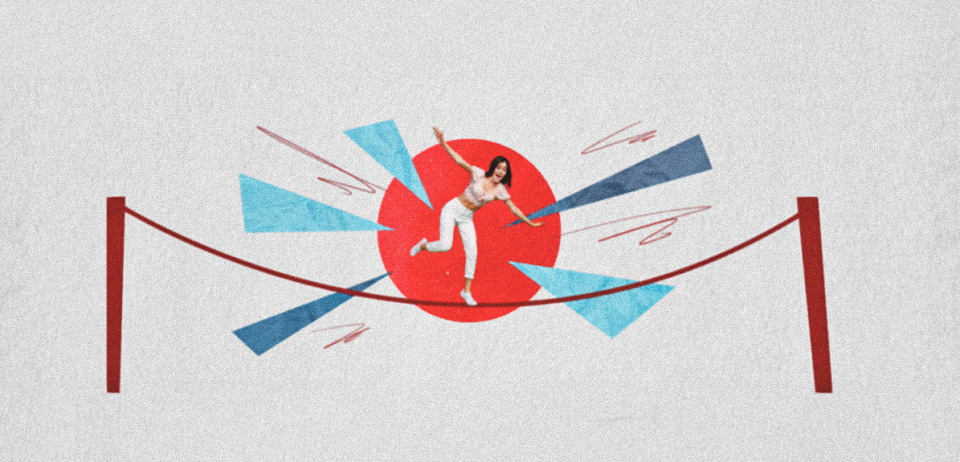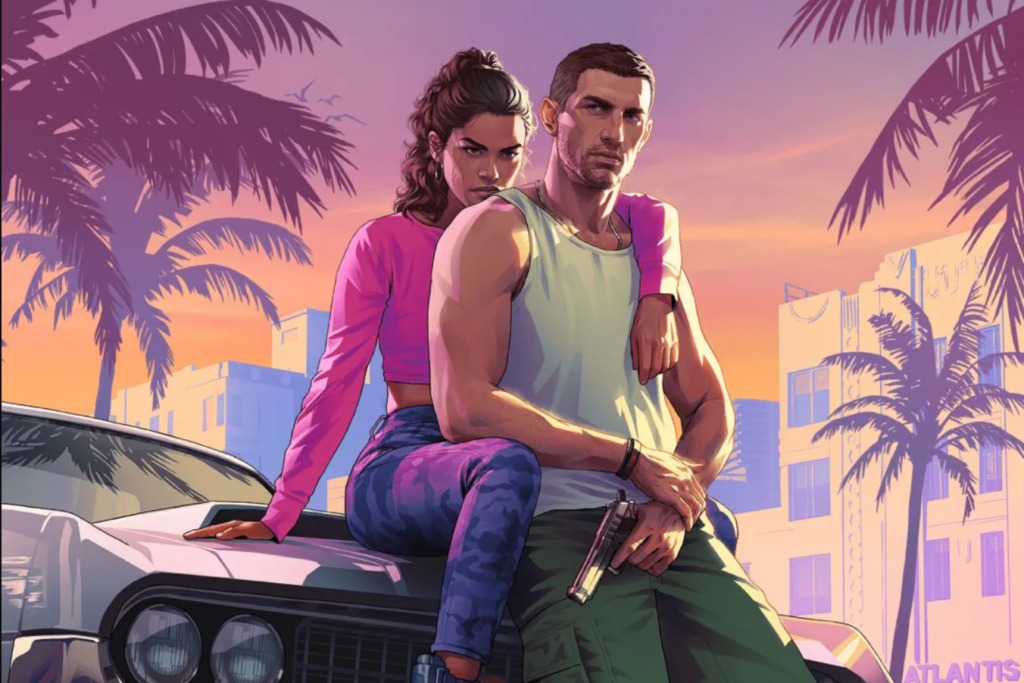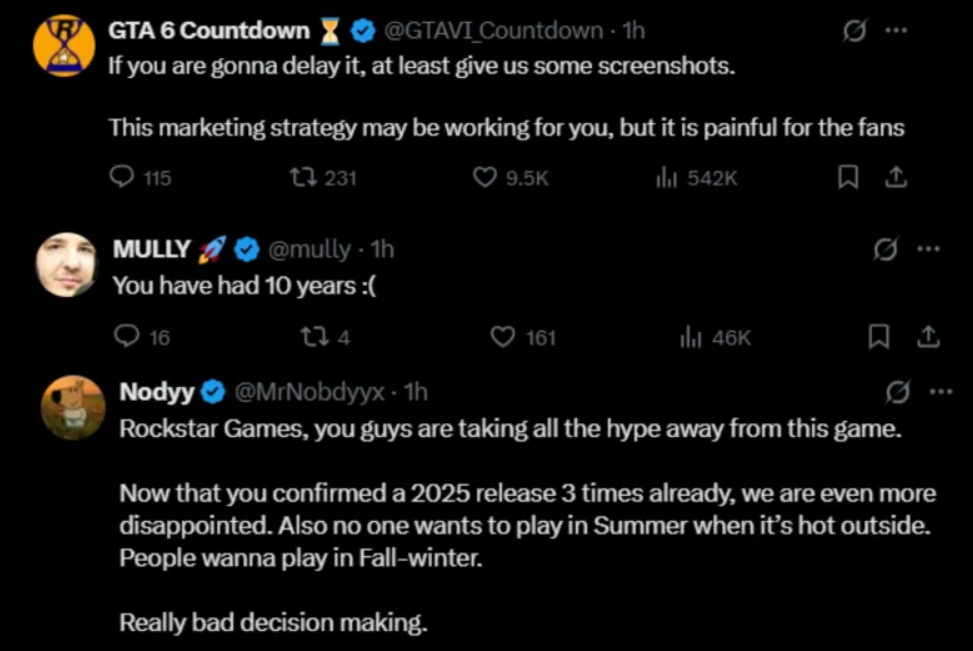
GTA 6 Trailer Dropped ‘Again’ but Audience is Overwhelmed
Rockstar has re‑released the GTA 6 trailer, this time alongside the official delay to May 26, 2026. Yet with only two teasers in nearly two years of hype, fans are oscillating between awe and exhaustion.
Audience has been anticipated since 2013, but Rockstar officially announced it in 2022, with a teaser finally dropping in late 2023. After a decade of rumors, leaks, and first-look frenzy, the second GTA 6 trailer failed to re‑ignite the initial hype. With viewership down by ~20 million in just 24 hours, it’s clear: Rockstar’s suspense game is cracking under overexposure stress—even CFOs are admitting that suspense can slide into saturation
Rockstar and parent Take‑Two have mastered suspense, but today that suspense risks dissolving into exhaustion.
Let’s dig deep to explore why their strategy is sliding toward ad burnout and examine two high-profile marketing flops that illustrate the dangers of overexposure.
The art of anticipation gone too far with the new GTA 6 trailer
Strauss Zelnick, Take‑Two’s CEO, has repeatedly emphasized that GTA 6’s marketing window is being held tight on purpose.

“The anticipation for [Grand Theft Auto 6] may be the greatest I’ve ever seen for an entertainment property, and I’ve been around the block a few times,” he told Bloomberg.
“We want to maintain the anticipation and the excitement, and provide marketing materials relatively close to the release window to balance the excitement with the anticipation.”
He famously compared Rockstar to competitors who schedule marketing years in advance—Rockstar prefers strategic scarcity. The scarce model worked for GTA 5 and RDR2: trailers were revealed early, followed by long, quiet stretches, with a marketing crescendo shortly before launch.
The hope this time is that silence breeds hunger. But there’s a tipping point.
When limitation becomes overload
After the December 2023 trailer—which shattered viewership records—Rockstar went silent. Yet coverage didn’t stop. Leaks flooded forums, fan theories bloomed, media outlets recapped the same trailer ad infinitum, and speculation dominated timelines. What started as controlled scarcity has devolved into noise without substance.
A former Rockstar developer, Mike York, echoed this in a recent blog: “The more they’re silent, the better it is… It creates allure, mystery, and gets people talking about the game without the company having to do anything.”

This unpaid echo chamber no longer amplifies the brand rather dilutes it. Fans express frustration that only one trailer and zero gameplay contradicts the promise of a short, focused campaign. One Reddit commenter noted: “Worst so FAR… but the casuals will get their interest back when the marketing ramps up.”
Players who want to feel informed or hyped are left empty-handed, while media outlets recycle stale content. That’s a recipe for fatigue.
A release delay and rising stakes
Adding to the mix is the game’s delay to May 2026—a full year from now.
That means silence must extend even further, or explosive marketing must finally begin. Either way, the risk grows. Stretch the quiet too long, and fans move on. Start charging too early, and Rockstar becomes another over-hyped brand.
Zelnick’s assurance that development will only complete when the game is “optimized creatively” is noble—but a much longer leash for marketing also invites more scrutiny.
However, Rockstar’s GTA 6 marketing strategy is not one of its own. Two recent campaigns illustrate how even the biggest brands can crash under their own hype.
Netflix’s “Squid Game” spinoff blitz
In late 2023, Netflix launched an oversized marketing blitz for “Squid Game: The Challenge.” Teasers, celebrity cameos, influencer partnerships, press trailers, and splashy stunts overlapped week after week. The label “the greatest reality show ever” saturated headlines. Yet viewership numbers fell short of expectations. Critics pointed to audience fatigue: the novelty of the Squid Game universe had been blunted by relentless hype. Viewers were fatigued before the show even aired.
Analysis: Netflix’s drip‑feed, multi-channel blitz extinguished its own momentum. By barrage-level marketing, it turned potential excitement into background noise. The show was overshadowed, not uplifted, by all the promotional weight.
Peloton’s post-pandemic rebound
Peloton exploded during the pandemic, then crashed. In 2021–2022, they tried reviving the brand with heavy discounts, celebrity partnerships, and non-stop ad placements. Brightly lit living rooms with actors sweating away, plagued by jingles and slogans.
But instead of rebuilding trust, the ads reminded viewers of the company’s struggles—recalls, financial losses, and leadership turmoil. The result: ad avoidance. Consumer perception didn’t shift; Peloton became the embodiment of “too much, too fast.”
These two cases show how quickly over-marketing backfires—once the pendulum swings too far, returning becomes a challenge.
Where Rockstar could misstep with GTA 6 trailer
Rockstar is balancing on that same tightrope. They want to maintain organic buzz, but today, that buzz is just noise.
The question now is: Will the second trailer drop early enough to cut through fatigue or too late, when attention has wandered? The longer the silence, the more likely every new promotional asset will feel like part of a desperate scramble to regain relevance.
Take‑Two has hinted at a “mid‑year” ramp‑up, but without timing alignment, each new teaser risks firing into an empty inbox.
GTA 6 trailer’s marketing strategy is paradoxical; it wants to recreate mystery and harvest buzz, yet currently delivers neither. The scaffolding of anticipation is cracking from both silence and saturation.
Zelnick’s quotes show the intent: “balance excitement with anticipation,” avoid over‑communication—but he’s acknowledged that timing isn’t always perfect.
Cut to the chase
Dropping GTA 6 trailer again and announcing delay in the release of the most-anticipated game of the decade can become fatal for the company. Rockstar does this better than most contemporary brands. But, they simply need to remember that suspense must convert to substance.

